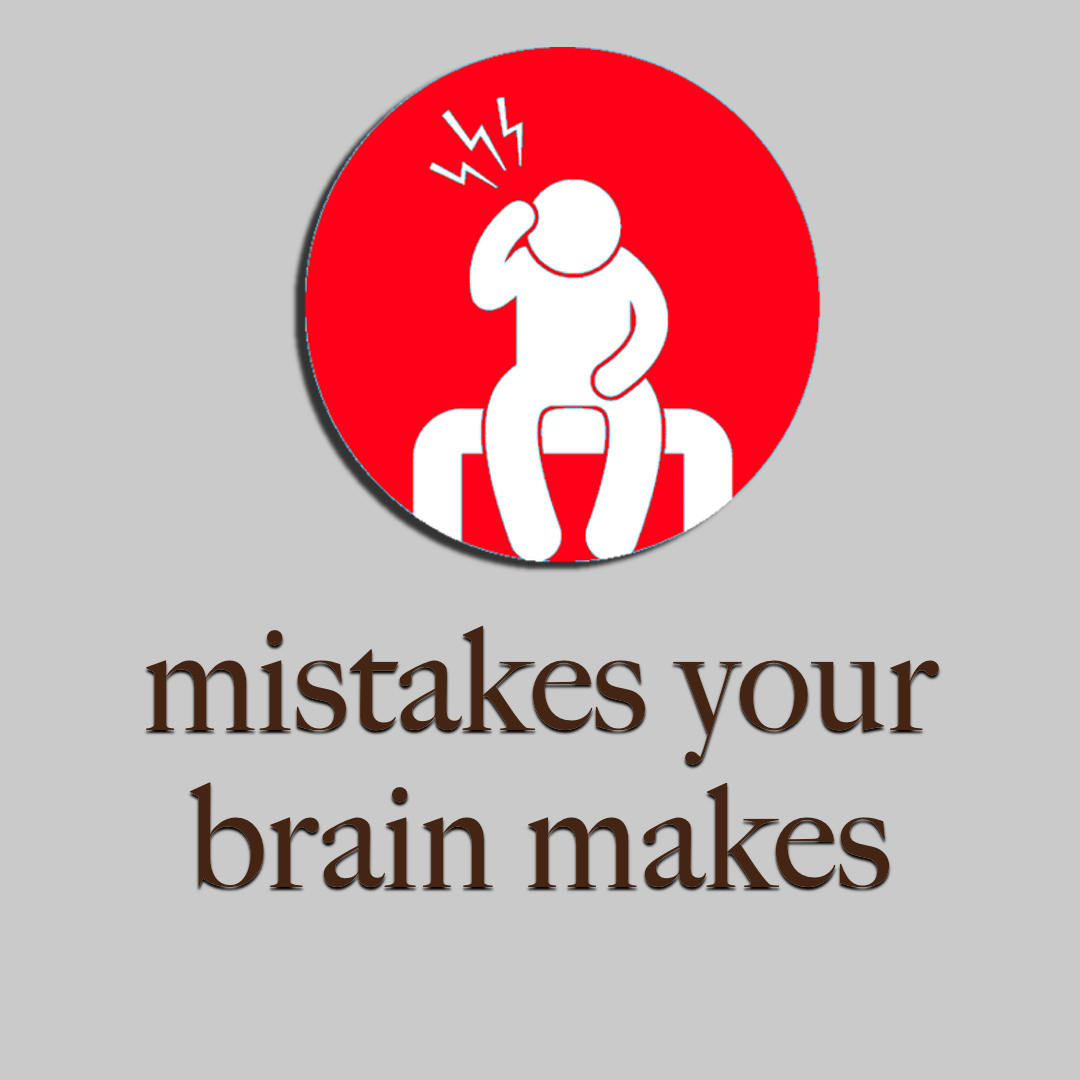Well, now you know your brain makes mistakes without you even realizing it.
In fact, it is probably making a few mistakes as you are reading these words. Yep, you read that right. Your mind is full of biases based on your past experiences. And it is not just you. That holds true for every one of us. It is like we are all inmates looking through the bars of a prison cell who have long forgotten that the bars even exist.
So, (1) your beliefs imprison you. (2) your biases skew your perception. (3) these biases are causing you to make errors in judgement…all the time.
WAIT STOP…THERE IS GOOD NEWS!!
By paying attention to your thought patterns through mindfulness you can become aware of these mistakes as they happen.
So, let’s take a look at these seven mistakes you can overcome with the use of being mindful.
YOU PRIORITIZE AVOIDING DISCOMFORT OVER ACHIEVING YOUR DREAMS
Have you ever sat through a horrible movie because you paid money for the ticket?
If the answer is yes, then you are not alone. The truth is most of us would rather suffer through an awful movie rather than do something more enjoyable with our time.
That sounds really messed up. Why? Well, because we want to get our money’s worth. (pretty ridiculous)
“Evolutionary science,” says that our tendency to avoid threats, as opposed to our tendency to maximize opportunities – gave us the best chance of survival from predators. And this tendency was passed on through the generations.
You are already hard-wired to prioritize loss minimization over opportunity maximization. We all are!
The great news is, phew…we no longer need to stay there. We can live our life to the fullest and walk out of that movie. A great way to approach things is to ask yourself what you want most out of life. You will naturally gravitate towards the things that matter most and give yourself the best chance of realizing your dreams.
YOU INCORRECTLY PREDICT ODDS
Imagine this. You toss a coin, which has a 50/50 chance of turning up heads or tails.
Now, let’s say the coin turned up tails the last 23 times.
Surely the next time you toss the coin it is going to turn up heads.
Right? WRONG
The truth is the odds do not change.
They are still 5050. The past 23 tails do not affect the probability of the next toss in any way whatsoever. Despite knowing this fact, you have this tendency to expect an irrational outcome based on past results.
The gambler’s fallacy is based on this glitch in our thinking.
Okay…stay with me.
There is a simple solution.
You can use a mindfulness-based approach.
Pause and take a deep breath.
Taking a deep breath disconnects you from your irrational mental tendencies. (this is totally true, it really does) It forces you to pause and reconnects you with your rational self. It creates some space in your thinking. Do this and you are much less likely to be seduced by your irrational thinking. Give it a try!
YOU CONVINCE YOURSELF THAT YOUR BAD DECISIONS ARE GOOD
Have you ever tried to convince yourself that buying that extra pair of shoes you did not need was not such a bad decision?
If so, you were hit by cognitive dissonance.
Cognitive dissonance occurs when you have two opposing ideas that you cannot simultaneously hold in your mind. You want to think of yourself as an astute decision-maker, and a lousy decision is directly opposed to this image. So you end up convincing yourself that the decision was a good one to make it consistent with your self-image.
How can you move past this learned negative belief?
The best way to overcome cognitive dissonance?
That is right…be mindful. Be mindful of your tendency to rationalize bad decisions, so you are more aware of when you are doing it. And when you are aware, make a conscious effort to accept that you occasionally make bad decisions (and that is totally fine as long as you learn from it). Because you have let go of the idea of being an astute decision-maker, you can now accept that you made a bad decision. The last step is to resolve to learn from the bad decision.
So, yes, by using mindfulness, you will have replaced your tendency to rationalize bad decisions with the ability to learn from them. Your decision-making skills can only improve over time.
YOU PAY MORE ATTENTION TO INFORMATION THAT MATCHES YOUR BELIEFS
Do you ever notice what happens when you buy a new car? You suddenly start seeing a whole lot of new cars on the road. This is because our brains passively seek out information that confirms our reality.
Do you tend to gravitate towards people who share your worldview, or away from them? I am guessing that most of your friends have beliefs that are aligned with yours. There is a term for it…confirmation bias. We are drawn to ideas and information that confirm our beliefs. And this means we become narrow-minded, limited thinking and stifled creativity. Now, of course, it is perfectly okay and normal to have friends who share your beliefs. This is about acceptance. It is important that we accept other beliefs are equal to our own, even if we do not agree with them.
The ability to do this can be rare. But it is essential for creativity and growth. It also means you do not have to be stuck looking at things in the same way. If you want to overcome the limiting constraints of confirmation bias then use…that’s right…mindfulness to become aware of this tendency.
YOU CONFUSE SELECTION FACTORS WITH RESULTS
Do top universities like Harvard produce brilliant graduates because they have an awesome program? Or is it because they only accept the smartest people?
Let’s face it these people would be successful regardless of what university they went to. But for some reason, it is more likely that their success is attributed to the university and not the person.
Rolf Dobelli says that professional swimmers do not acquire swimmer’s physiques because of rigorous training. It is the other way around: they become professional swimmers because they were born with physiques suited to swimming. In other words, their physiques are a factor for selection and not the result of their training.
The problem here is that you are attributing success to incorrect factors and (incorrectly) expect to succeed.
Here is the best example: Seeing a skinny model on TV drinking a calorie-packed drink leaves you with the impression that the contents are good for you. But we all know that nothing could be farther from the truth. And yet, those images on the TV influence you to buy that calorie-packed drink which will really only take you further away from that perfect body you have been taught to crave.
So what can you do to counteract this? Again, you need to learn to let go of those negative beliefs. Do not take things at face value. Be mindful of the messages that are coming at you every day. More importantly, be mindful of how these messages impact your behavior.
YOU ALLOW YOUR PERCEPTION TO BE MANIPULATED
Ever bought something that was a one-day special sale price? You walk away feeling like you got a bargain. Not so much. You have fallen victim to the anchoring effect. This is a cognitive bias that gets you to rely too heavily on the first piece of information you receive. It assigns that first piece of information as the reference point – the anchor. Stores use it to convince you to buy all the time.
Imagine this.
You walk into a clothing store. You are greeted by this big sign, which reads, “SALE – ALL OUR SHIRTS ARE REDUCED FROM $100 TO $40.
HURRY, SALE ENDS TODAY!”
And you think to yourself: “Wow, I wasn’t exactly in the market for a new shirt but this is such a steal. Over 50% off! After all, well-made clothes last longer than cheap ones.”
So you buy it.
The thing is if the shirt had originally been priced at $40 you probably would not have felt like it was such a good deal. But when you saw it marked down from $100 to $40 that got you interested.
You were subconsciously influenced by the first $100 price you saw – presented to you by the store that was trying to sell you the shirt.
We are wired to make estimates based on comparisons. And in the absence of any other information, we unconsciously lean towards the first value we heard.
So how do you overcome this tendency?
Well, be mindful of course. Be mindful of the anchoring effect.
It all comes down to paying careful attention to what is happening in the present moment. And that essentially, is what mindfulness is all about. Being fully in the moment will help you to focus on all the relevant factors – right here and now. And this is bound to improve your decision-making abilities.
Have you ever faced a situation where you had too many choices and ended up not making a decision at all?
Welcome to the paradox of choice.
When we have too many options in front of us we often shut down. We get overwhelmed and walk away from the situation altogether. At other times we simply choose anything just to get the process over and done with.
YOU DON’T TAKE CONTROL OF YOUR OVERWHELM
The solution? Well, not to state the obvious but narrow your choices down.
Systematically eliminate choices that are clearly not relevant to you before you start feeling overwhelmed. Pay more attention to what you want to get out of the situation and less attention to the choices. It helps to be really clear on your objectives.
A great way to do this is to revisit your goals regularly.
Be clear on what you want to accomplish each day and make a targeted to do list. Do this, and you will realize that a lot of the “choices” that are presented to you are not relevant to you at all. You will spend more time on doing things that matter to you – and pay less attention to distractions that do not really matter.
MINDFULNESS
Imagine sitting on a beach watching the waves (your thoughts) on the ocean (your mind). You are watching the entire ocean – including the waves as they rise and fall. It is really peaceful. Sooner or later your attention gets caught up in one of the waves. You being to identify with that one wave (one thought), and in that moment your awareness contracts. You have lost sight of the big picture. The moment you become aware of this, you gently bring your attention back to your breath and broaden your focus so you are watching the entire ocean again.
Doing this consistently is mindfulness practice. It is like meditation in action. And as your awareness grows you will become conscious of your limiting thought patterns. You will become a lot more productive and you will live better.
For the next six months…don’t scratch that.
For the next week, focus on creating a mindfulness practice. Use your breath as an anchor, watch your mind and it’s mental patterns in the present moment.
Pay attention to what is happening in the here and now.
Do that and you will be amazed at how many of these common brain mistakes you overcome through self-awareness.



